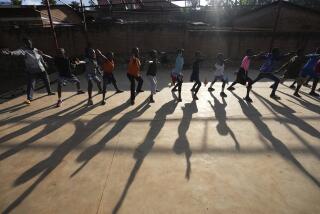Justice Stalls in Suffering Rwanda : War has left the prisons and vengeance overflowing
- Share via
There is no justice in Rwanda. The squalid jails are packed with as many as 76,000 prisoners suspected of taking part in the genocide that killed hundreds of thousands of Tutsis two years ago. Most prisoners have not been charged. Most of the masterminds of the ethnic cleansing live in exile beyond the reach of the new government. Until these murderers are prosecuted, Rwandans cannot put this sorry chapter behind them.
Former Rep. Howard Wolpe (D-Mich.), an expert on Africa, traveled last month to neighboring Burundi, where the ethnic hatreds that plague Rwanda are likely to explode. President Clinton’s national security advisor, Anthony Lake, went to the region in May to help find a political solution to the crisis.
Some wounds may never heal. The United Nations estimated that between 500,000 and 800,000 Tutsis and Hutus lost their lives in 1994. Others were raped, tortured or maimed during the fighting. Now that the Tutsis run the government, many officials demand harsh punishment for all who were involved.
Punishment is appropriate, of course, and the harshest penalties should be reserved for the leaders of the massacre. But Rwandan officials who insist on an eye for an eye need to consider different forms of punishment. Too many seem intent on simply settling the score.
A proposed plea bargaining law, recommended by the Cabinet, would mandate execution for planners and organizers of the systematic massacre. The same law would reduce penalties for those who followed orders, if they agreed to plead guilty. Under this staggered system, defendants who pleaded guilty prior to trial would serve 12 years. Those who pleaded guilty during trial would get up to 15 years. Those who pleaded innocent and were convicted would be sentenced to life in prison.
If the Parliament approves the proposed law, the plea bargains will speed the process. Allowing defendants to make deals with prosecutors also could relieve some of the pressure on the jails. Many facilities are so crowded that inmates must take turns sleeping. Because of the overcrowding, dozens of prisoners have died this year of suffocation. Others have died of diseases while awaiting trial. Conditions are horrific by any standard.
While Rwanda authorities ponder how to prosecute the suspects, an international tribunal has accomplished little. So far, only three suspects have been arraigned. The tribunal can hand out only life sentences, a condition that frustrates Rwandan officials demanding death sentences.
Reconciliation is difficult because the current government remains under attack from Hutus who after fleeing to refugee camps have returned home intent on regaining power. These attacks on government buildings, cars, judges and innocent citizens exacerbate old wounds and harden the resolve to punish at all costs.
The United Nations and Western countries have provided nearly $30 million in foreign aid to rebuild the courts, train judges and improve prisons. Yet few trials have been held. International patience is running out. Linking additional humanitarian aid to progress would increase the pressure on the Tutsi officials who control the government.
More to Read
Sign up for Essential California
The most important California stories and recommendations in your inbox every morning.
You may occasionally receive promotional content from the Los Angeles Times.













